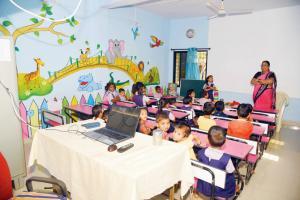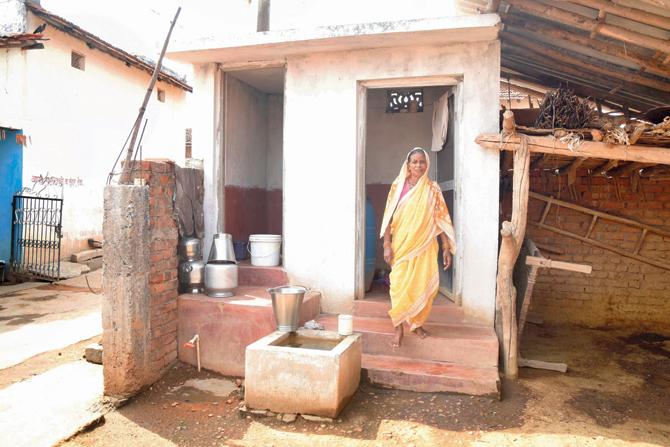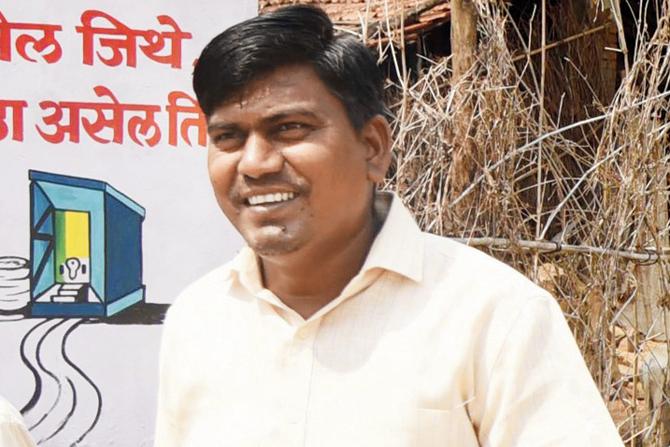Residents of a village in the Naxal belt have joined hands to manage their waste and replenish 'drying' ponds

The anganwadi has projectors in each classroom. Pics/Suresh Karkera
Back in 2013, Pardi Kupi village in the Gadchiroli taluka, was struggling with basic amenities like sanitation and roads. Today, the collective will of its people to fight the poor civic conditions in the village, has made it a model for others to follow. From setting up a state-of-the-art anganwadi to building concrete roads, adopting vermiculture and finding new solutions to conserve water, the village has managed to get it right within a short span of three years. Earlier this year, Pardi Kupi also received a cash prize of Rs 8 lakh, after it won second prize in the Adarsh awards, instituted by the state's Adarsh Gaon Yojana (AGY).
ADVERTISEMENT
Also Read: Teachers transform Gadchiroli Zilla Parishad school
Need for change
A few years ago, when village sarpanch Sanjay Nikare and villager Chandrashekar Murteli, inspired by the success story of Hirve Bazar in Ahmednagar that won the first Adarsh village award in 2008, mooted the idea of transforming Pardi Kupi. The village has a population of around 2,400 people. "Around 110 of us visited Hirve Bazar to understand how we could tackle basic civic issues in our village," said Murteli. After much deliberation, the villagers decided to pool in funds to rebuild their community. "We never got funding or support from any political party or leader. It was our gram panchayat that led the way," said Arun Mhashakhetri, another villager.

The toilets in Gadchiroli's Pardi Kupi have been designed by the locals
Rebuilding the village
Aside from the grants from zila parishad, the Pardi Kupi Gram Panchayat earns around R8 lakh annually from house tax collection and Rs 52,000 from tendering the weekly village market contract to a bidder from the village.
Some portion of this grant was spent on constructing concrete roads, where previously, there was a dirt track. Today, the entire village access road of 1,500 metres has been concretised. The panchayat is now planning to increase the width of the roads connecting the village with the zila parsihad school.
To tackle pollution and its waste disposal problem, villagers contributed to the construction of a new nullah. They also procured uniform dustbins (blue and green colours) for dry and wet waste, which were placed across the village. The village has already constructed a vermiculture pit, where kitchen waste and cowdung is dumped. It will later be used as manure for plants.
Also Read: Political tussle stalls bamboo factory in deprived Gadchiroli

Chandrashekar Murteli, villager
Pardi Kupi also initiated the task of building toilets in each of the 350 homes. Under the Swachh Bharat Abhiyan, each villager is entitled to Rs 12,000 for construction of a toilet. The Gram Panchayat mooted an idea to have uniform toilets with minimum four feet width and six feet height, so that sufficient space is available for a person to move around. "The villagers designed their own toilets and, instead of hiring contractors, we got masons and helpers to do the job for us directly. The Gram Panchayat monitored the work," explained Murteli. "We also got cement and sand at a discount, as we did bulk bookings."
In order to up security in the village, nine CCTV cameras have been installed at crucial areas. The monitoring happens round the clock at the Gram Panchayat office.
A state-of-the-art anganwadi was also recently constructed for toddlers, with desks and chairs for kids, and a projector for every class.
Fighting drought
Like most villages in Gadchiroli, Pardi Kupi also faces severe water shortage during summer. However, in order to prevent a drought-like situation, villagers constructed four barrages — an artificial barrier built across the pond to aid irrigation. This year, for the first time the village pond hasn't dried up.
Villagers now intend to construct an over-head water tank, which will supply potable drinking water to houses in the village. The gram panchayat is also planning to install a water meter in each house, so that it can monitor the water consumption.
Also Read: Inflated power bills force Gadchiroli into the dark
Catch up on all the latest Mumbai news, crime news, current affairs, and also a complete guide on Mumbai from food to things to do and events across the city here. Also download the new mid-day Android and iOS apps to get latest updates
 Subscribe today by clicking the link and stay updated with the latest news!" Click here!
Subscribe today by clicking the link and stay updated with the latest news!" Click here!






